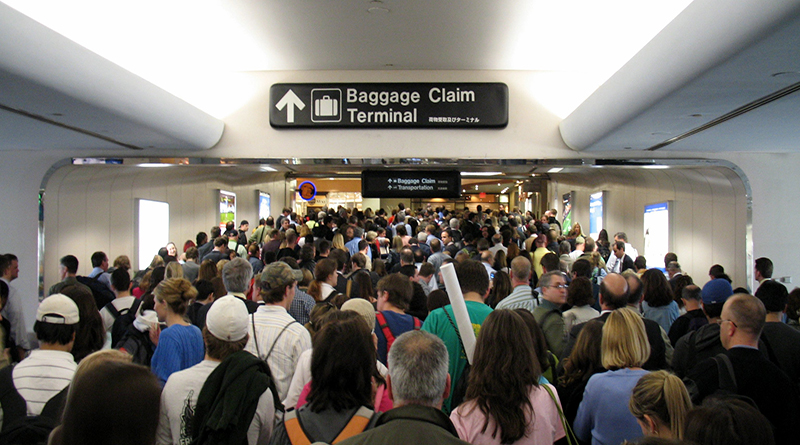
Autism Awareness is Great. Now it’s Time for Autism Acceptance.
By J.R. Reed
Autism Awareness and Acceptance
For as long as I can remember people have been preaching autism awareness. I was diagnosed nine years ago, and before my diagnosis, I remember learning the basics about what autism is and what autism isn’t. Now that I’ve had a nine-year real-life crash course in autism, I know a lot more than I did. Still, I knew enough pre-diagnosis to have a basic understanding.
Though there are a lot of people who are aware that autism exists, there are fewer who understand what autism is, so we still need to be out teaching the public and our first responders the basics of what it is to be on the spectrum, and how to best relate to us.
Here are two examples of how much we still need autism awareness. Both of these actually happened to me in the last six months.
One late afternoon this summer I was sitting in the driveway of my neighbors across the street. I don’t remember what we were talking about, but suddenly the wife, who is in her 60s, blurted out, “You know, I’ve wanted to tell you for a while that you don’t look autistic to me.”
I paused for a moment, holding my breath, and not allowing me to blurt out something I would later regret. I then said, “Really? Just out of curiosity what does an autistic person look like?”
She went into detail to describe a person with Downs Syndrome.
“Yeah,” I replied. “That’s not us. We pretty much look like anyone else.
Dealing with Ignorance
The second incident happened a couple of weeks ago where I was at a board meeting for an animal rescue that trains the rescue dogs to be service dogs for kids and adults on the spectrum. My service dog, Tye, came from there and was found in a garbage bag in a dumpster.
I’m the writer of the group and I told them I was taking a grant writing class next semester so that I could start raising some money to build new kennels and for new supplies. One of the other board members said, “Why do you need some special class? You’re supposed to be some hot shot writer (those words never came out of my mouth) writing is just slapping words on paper. Why can’t you just write them now?”
After letting the anger subside at this guy dissing what has been my profession for nearly twenty-five years, I explained that grant writing is a very specific style of writing and has to follow a certain formula if you want to see any money. This is where the insults began.
“Oh, I forgot,” he said. “You people are stupid.” I politely asked him if “my people were white males and reminded him that he too fit into that category. “No,” he replied. “The autistics.”
I’m the only autistic board member and not one person stood up for me. He sat there gloating and I told him that “his people” needed some education and reminded him that this charity was to help autistics. He asked who “his people” were and I told him, “those ignorant about what autism is and isn’t.”
From Awareness to Acceptance
So, you can see that we still need to teach people about autism awareness, but to me, more important lesson is autism acceptance. I’ve spoken to groups as small as twenty-five in a classroom, a webinar of over 300 and 1,500 in the Rotunda at the Missouri State Capitol. Each time I preached neurodiversity and how we as a community will never truly be a part of society until Neurotypicals become accepting of us and our amazing and varied talents.
Do we need some accommodations? Occasionally.
Do we always work in the conventional fashion? No.
Do we think outside the box and bring ideas to the table that no one has thought of before? Very often.
Are we dismissed as being weird, odd, or quirky and thus not listened to? Almost every day.
Acceptance in the Workplace
In a workplace setting, we as individuals need to stand up and be self-advocates and tell our superiors that we may do things in a different way than other employees, but if they’ll give us the chance we can prove that we’re more than capable of getting the job done.
Yes, it’s hard to do and you have to swallow a lot of fear and anxiety, but more often than not I think you’ll find that they’re not as hard-headed as you may think and that they will actually respect you for standing up.
Remember, at the end of the day they’re concerned with productivity and the almighty dollar. If they already have an employee on board and trained and all that needs to be done is a little tweaking, that’s a big savings over hiring someone new and training them.
On the other side, It’s up to advocates such as me and so many more great ones out there who need to get into corporate America as well as into mom and pop businesses and educate them on what we, as people up and down the spectrum, can bring to the table and how we can benefit the business without a lot of cost, if any. The average accommodation for an employee to a business is around $200. That’s not much.
Acceptance in Social Situations
Social situations are another place we need autism acceptance. Often the person with autism has anxiety that goes along with our being on the spectrum. Imagine having social anxiety, desperately wanting to have a friend or two. But there are two problems.
The first is that with our anxiety we’re afraid or leery of going places where we might tun into people, much less must interact and meet them. A lot of this has to do with trying it in the past and being shunned for being different. I truly believe that the reason must neurotypicals have a problem connecting with us on a friendship level is because they don’t understand us, and they fear what they don’t understand. In a word. Ignorance.
The second is that on the rare occasion you make a true friendship or relationship type connection with a neurotypical, it’s only time before they get sick of your quirks and dump you by the side of the road.
In my case, I moved from LA to the Ozarks a little over three years ago and I soon made a friend, another local writer. We worked on a couple of projects together and talked at length about my autism, anxiety, and depression. After about six months apparently, he got sick of my personal autistic quirks and when we met for coffee one day, he presented the reasons to me in a list. I showed the list to both my psychologist and psychiatrist, both agreed this guy was a bigot towards autistics and someone good to get out of my life.
I sent him a Facebook message and said that we lived in a community of 4,000 and I didn’t want things to be awkward between us if we ran into each other. His reply was to tell me that if I ever tried to contact him in any way, he would be “forced” to tell people verbally and in words online about all the things I shared about my autism, anxiety and depression. In other words, he was going to commit slander and libel.
There were also a couple of places we both hung out. It was made truly clear that those were HIS places and I had to find new places to spend my time. For the last two + years, I’ve been staying indoors a lot and avoiding this unaccepting neurotypical.
We all have stories like that and that’s why acceptance in social situations is a huge priority as well as a huge fear.
Acceptance in Schools
The final place we need to work on acceptance is in our schools. In a district near me, everyone from the Special Ed Director down to the teachers and other students, openly refer to the Special Ed kids as Sped Kids. Tell me hearing that enough won’t break you down and probably kill your self-esteem for life! I know that hearing, “Weird, stupid,” and , “lazy” from teachers starting in fifth grade (at Christian school) still is with me at age 55.
That’s akin to repeatedly calling the neurotypical kids, “fat,” “ugly.” Or, “weird” during their entire school career. Those students develop social and mental problems as well. Many that stick for them with life.
If we could just get the adults to stop talking disrespectfully to the Special Ed students, I think a lot of social dynamics between neurotypical and the rest of us would improve greatly.
Also, having an assembly where you talk about the realities of what these kids go through, how much they have to offer and how they can be great, loyal friends would be amazing. Breaking it down into some smaller groups at the end to do some Q & A with the moderators would be beyond helpful.
The Future of Acceptance
So, there you have it. Three key areas that we must attack and work with before we see true autism acceptance, or neurodiversity.
I’m 55. Will we see it fully happen in my lifetime? Probably not. But we can plant the seeds and continue to help them grow until finally almost everyone is aware of what autism is and has the capacity to accept us for the amazing, odd, quirky, occasionally slightly weird people that we are. We doubt ourselves so much, but we bring great things to whatever situation we’re thrust into.
Which one do you think is most important and what will you pledge to work on?
Let us know and let’s start a conversation.

J.R. Reed is a late diagnosed adult who was diagnosed with Asperger’s nine years ago. Since then he has taken a twenty + year freelance writing career and changed focus to developmental disabilities and mental health.
In 2012 he created the website/blog Not Weird Just Autistic, as he spent the first 45 years of his life thinking he was weird, but now knows he’s just autistic, with still a smidge of weird in there.
He currently writes for The Mighty, Different Brains, and Not Weird Just Autistic. J.R. also teaches online classes, speaks to groups as small as 15-20 or as large as 1,500 in the Missouri State Capitol.
J.R. sits on the board of three autism charities and in the next couple of months will begin advising on developmental disability policy on the state and national levels.
The author of An Asperger’s Guide To Dating Neurotypicals, J.R. works with those high school age through adult to help them live better lives as well as educates NT’s on who we really are. He’s currently working on the books, Autism Isn’t Contagious, and Asperger’s is My Superpower.




